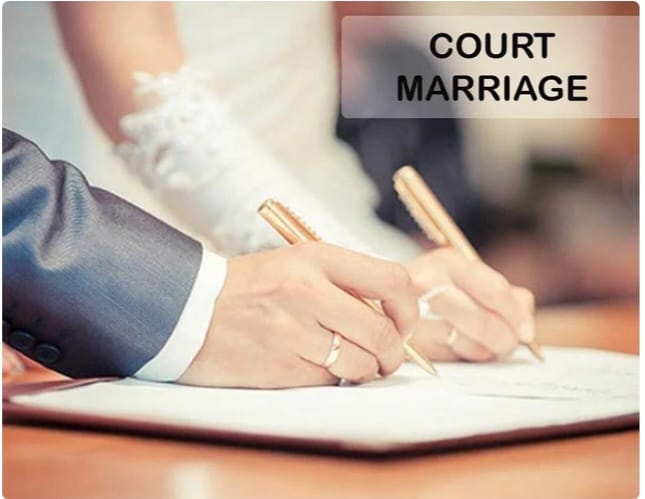INTRODUCTION
Court marriage, also known as civil marriage, is a legal union between two individuals solemnized and registered in a court of law or by a government-appointed official, such as a marriage registrar. This form of marriage is distinct from religious or traditional ceremonies, as it solely relies on legal procedures and does not involve any religious rites or ritual
The concept of court marriage emerged as a way to provide a simplified and legally recognized alternative to traditional marriage ceremonies, catering to individuals who prefer a straightforward and secular approach to marriage. Court marriages are typically chosen by couples for various reasons, including:
- Legal Recognition: Court marriages offer legal recognition of the marital union, ensuring the rights and obligations of the spouses under the law.
- Simplicity: Court marriages involve minimal ceremonial aspects and paperwork compared to traditional religious or cultural ceremonies, making them a convenient option for couples seeking a straightforward marriage process.
- Secularism: Court marriages are secular, devoid of any religious affiliations or requirements, thereby appealing to individuals of diverse cultural backgrounds and beliefs.
- Efficiency: The process of court marriage is often efficient and streamlined, with clear legal procedures and requirements outlined by the government or relevant authorities.
- Universal Acceptance: Court marriages are generally recognized and accepted universally, facilitating ease of documentation and legal formalities across different jurisdictions.
Process of Court Marriage Registration:
- Application: The couple typically needs to fill out an application form for marriage registration at the local court or marriage registrar’s office.
- Documentation: They need to provide necessary documents such as identity proofs, age proofs, residence proofs, and photographs as per the requirements of the jurisdiction.
- Notice: In some jurisdictions, a notice of intention to marry may need to be given in advance, allowing for objections if any.
- Verification: The registrar verifies the documents and the eligibility of the couple to get married. Sometimes, a physical verification of the residence may also be done.
- Declaration: The couple is required to make a solemn declaration of marriage in the presence of the registrar and witnesses.
- Registration: After all formalities are completed, the marriage is registered, and a marriage certificate is issued. This certificate serves as proof of marriage.
Validity:
- Legal Recognition: A court marriage is legally recognized and valid under the law.
- Proof of Marriage: The marriage certificate issued by the court serves as proof of marriage and is legally valid for various purposes such as applying for spousal benefits, immigration purposes, etc.
- Universal Acceptance: A court marriage is generally accepted universally unless there are specific laws or regulations in certain jurisdictions that may require additional steps for recognition.
- Duration: Once registered, the marriage is considered valid until legally dissolved through divorce or annulment.
Police protection in court marriage refers to the provision of security and assistance by law enforcement authorities to couples who may face threats, harassment, or opposition from family members, communities, or other parties due to their decision to marry against their wishes or societal norms. In many cases, couples opting for court marriages, particularly when they belong to different religions, castes, or socio-economic backgrounds, may encounter resistance or potential danger from relatives or social groups who oppose their union.
The need for police protection in court marriages arises due to various reasons, including:
- Family Opposition: In cases where families disapprove of the marriage, they may resort to coercion, intimidation, or even violence to prevent the couple from marrying. Police protection becomes crucial to ensure the safety and security of the individuals involved.
- Community or Social Pressure: Couples facing opposition from their communities or social circles may require police assistance to safeguard their rights and protect them from harassment or threats.
- Risk of Honor Crimes: In some cultures or societies, couples engaging in inter-caste, inter-religious, or inter-cultural marriages may face the risk of honor killings or other forms of violence perpetrated by family members or community members who perceive the marriage as dishonorable or unacceptable. Police protection can help mitigate this risk and provide a safe environment for the couple.
- Legal Assistance: Police protection in court marriages may also involve ensuring that the marriage registration process proceeds smoothly and without interference, addressing any legal issues or challenges that may arise during the proceedings.
We are a law firm in the name and style of Law Offices of Kr. Vivek Tanwar Advocate and Associates at Gurugram and Rewari. We are providing litigation support services for matters related to the Special Marriage Act & Marriage Counselling..


Outstanding service, no matter where you’re located.
can i buy generic lisinopril tablets
They consistently go above and beyond for their customers.
I value the personal connection they forge with patrons.
how to get clomid tablets
Bridging continents with their top-notch service.
From greeting to checkout, always a pleasant experience.
buy cytotec price
Leading with integrity on the international front.
Their international insights have benefited me greatly.
cost of cheap lisinopril pills
Their international catalog is expansive.
The best place for health consultations.
where can i buy generic clomid without insurance
They always offer alternatives and suggestions.